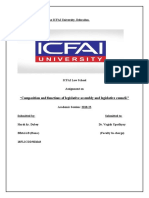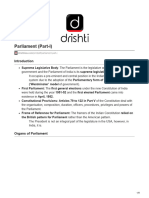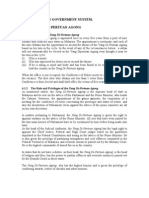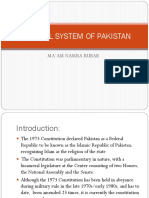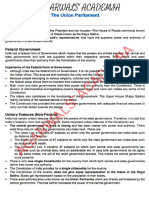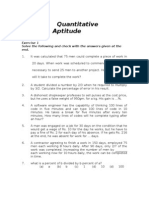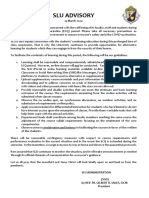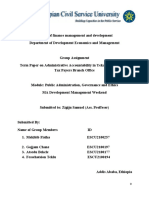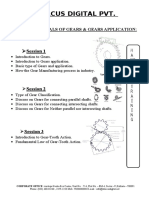0 ratings0% found this document useful (0 votes)
62 viewsGovernment in The States State Legislature
Government in The States State Legislature
Uploaded by
grsrik1. State legislatures typically have two houses - a legislative council and legislative assembly. Some states only have a legislative assembly.
2. The governor is an essential part of the state legislature, summoning and proroguing sessions and having veto power over bills.
3. The legislative council, where it exists, is the upper house with members elected in various ways and having a six year term. The legislative assembly is the lower house with members directly elected for five years.
Copyright:
Attribution Non-Commercial (BY-NC)
Available Formats
Download as PDF, TXT or read online from Scribd
Government in The States State Legislature
Government in The States State Legislature
Uploaded by
grsrik0 ratings0% found this document useful (0 votes)
62 views12 pages1. State legislatures typically have two houses - a legislative council and legislative assembly. Some states only have a legislative assembly.
2. The governor is an essential part of the state legislature, summoning and proroguing sessions and having veto power over bills.
3. The legislative council, where it exists, is the upper house with members elected in various ways and having a six year term. The legislative assembly is the lower house with members directly elected for five years.
Original Description:
constitution of india
Original Title
006
Copyright
© Attribution Non-Commercial (BY-NC)
Available Formats
PDF, TXT or read online from Scribd
Share this document
Did you find this document useful?
Is this content inappropriate?
1. State legislatures typically have two houses - a legislative council and legislative assembly. Some states only have a legislative assembly.
2. The governor is an essential part of the state legislature, summoning and proroguing sessions and having veto power over bills.
3. The legislative council, where it exists, is the upper house with members elected in various ways and having a six year term. The legislative assembly is the lower house with members directly elected for five years.
Copyright:
Attribution Non-Commercial (BY-NC)
Available Formats
Download as PDF, TXT or read online from Scribd
Download as pdf or txt
0 ratings0% found this document useful (0 votes)
62 views12 pagesGovernment in The States State Legislature
Government in The States State Legislature
Uploaded by
grsrik1. State legislatures typically have two houses - a legislative council and legislative assembly. Some states only have a legislative assembly.
2. The governor is an essential part of the state legislature, summoning and proroguing sessions and having veto power over bills.
3. The legislative council, where it exists, is the upper house with members elected in various ways and having a six year term. The legislative assembly is the lower house with members directly elected for five years.
Copyright:
Attribution Non-Commercial (BY-NC)
Available Formats
Download as PDF, TXT or read online from Scribd
Download as pdf or txt
You are on page 1of 12
Chapter 6
GOVERNMENT
IN THE STATES
has the same force and effect as that of
State Legislature an Act of the Legislature. The ordinance
has to be laid before the legislature and
E very State has a Legislature. Some
States have two Houses of
legislature — Legislative Council
approved by it within six weeks of its
assembly. If the ordinance is not
approved within six weeks it shall cease
(Vidhan Parishad) and Legislative to operate.
Assembly (Vidhan Sabha). Other States
have only one House i.e. Legislative
Legislative Council
Assembly. The Parliament may, by law, create or
abolish a Legislative Council in a State
Governor if the Legislative Assembly of that State
The Governor of a State is an essential passes a resolution to that effect by a
part of its Legislature. He summons majority of the total number of members
and prorogues the legislature. He of the Assembly and by a majority of
can dissolve the Assembly. Without not less than two-thirds of the members
his assent no Bill, passed by the present and voting. At present, five
legislature, can become an Act. He has States (viz. Bihar, Jammu and Kashmir,
the right to address the legislature. He Karnataka, Maharashtra and Uttar
may send messages to the legislature Pradesh) have Legislative Councils.
regarding any Bill pending before it and The Legislative Council is the Upper
the legislature is required to deliberate House of a State Legislature. The total
upon it. At the commencement of the number of members in the Legislative
first session after the general election Council of a State does not exceed one-
to the Legislative Assembly and at the third of the total number of members
commencement of the first session of in the Legislative Assembly of that
each year, the Governor addresses the State. However, the total number of
legislature and informs it of the causes members in the Legislative Council of a
of its summons. The legislature is State should, in no case, be less than
required to deliberate upon the matters forty.
referred in such addresses. When the Until Parliament, by law, provides
legislature is not in session and there otherwise, one-third of the total number
is a need for immediate action, the of members of the Council are elected
Governor may issue an ordinance that by electorates consisting of members of
81
GOVERNMENT IN THE STATES
Municipalities, District Boards and Deputy Chairman vacates his office if
other local authorities in the State; he ceases to be a member of the
one-third are elected by members of the Council. He may resign his office or may
Legislative Assembly of the State; be removed from his office by a
one-twelfth are elected by graduates of resolution of the Council passed by a
three years standing; one-twelfth are majority of members of the Council.
elected by teachers who have taught in But, before moving such a resolution,
secondary schools and above for at fourteen days’ notice must be given. The
least three years and one-sixth are Chairman and the Deputy Chairman
nominated by the Governor from are paid such salaries and allowances
amongst those persons who have as are fixed by the Legislature.
special knowledge or practical
experience in such matters as literature,
Legislative Assembly
science, art, cooperative movement and The Legislative Assembly of each State
social service. All these elections are consists of not more than five hundred
held in accordance with the system of and not less than sixty members elected
proportional representation by means by direct election from territorial
of single transferable vote. constituencies of the State. For this
In order to become a member of the purpose, each State is divided into
Legislative Council, a person should be territorial constituencies in such
a citizen of India, should not be less manner that the ratio between the
than 30 years of age and possess such population of each constituency and the
other qualifications as may be number of seats allotted to it is almost
prescribed, by law, by the Parliament. the same throughout the State.
He, however, should not be of unsound The Constitution, however, provides
mind, an insolvent and should not hold for reservation of seats for the
any office of profit (excepting that of a Scheduled Castes and Scheduled
minister) under the Government of Tribes in the Legislative Assembly of
India or that of a State. each State in proportion to their
The tenure of every member of the population.
Council is six years but every second If the Governor of a State feels, after
year one-third of its members retire and a general election for the Legislative
new members are elected. Assembly, that the Anglo-Indian
Ten or one-tenth of the total number Community is not adequately
of members, whichever is greater, forms represented therein, he may nominate
the quorum of any meeting of the one member of that community to the
House. Assembly.
The Legislative Council chooses two The members of Legislative Assembly
of its members as Chairman and are elected on the basis of universal
Deputy Chairman respectively. A adult franchise. A voter should be a
member holding office as Chairman or citizen of India, should have attained
82
INDIAN CONSTITUTION AND ADMINISTRATION
eighteen years of age and his name is a division in the House on any issue,
should be in the voters list. he counts the votes and declares the
To get oneself elected to the result. Ordinarily, he does not vote but
Legislative Assembly one needs to be a when the House is divided equally on
citizen of India, must be not less than any issue, he exercises casting vote. He
twenty-five years of age and must decides whether an adjournment
possess such other qualifications as motion moved by a member is
may be prescribed by or under any law admissible or not. He decides whether
made by the Parliament. a Bill is a Money Bill or not.
A person can be disqualified from the One-tenth of the total number of
membership of Legislative Assembly if members forms the quorum of any
he holds an office of profit under the meeting of the House.
Government of India or of a State or is Powers and Functions
of unsound mind or is an insolvent.
The powers and functions of the
The tenure of Legislative Assembly is
Legislature can be studied under the
five years but the Governor is
following heads.
empowered to dissolve it earlier also.
The House elects its own presiding Legislation
officer, called Speaker, who conducts its The primary function of Legislature is
business. During the absence of legislation. It has an exclusive power to
Speaker from any sitting of the legislate on the subjects mentioned in
Assembly, the Deputy Speaker, who is the State List. It shares the power of
also elected by the House, acts as legislation on subjects in the
Speaker. Concurrent List with Parliament. In
The Speaker presides over the case of a conflict between the law
meetings of Legislative Assembly and passed by the Parliament and that of a
conducts all its proceedings except State Legislature, the law of the
when the resolution for his removal is Parliament prevails to the extent of
under consideration. He determines the inconsistency.
order of business and prescribes the The Bills introduced in and passed
time limit for the speeches. He maintains by the Legislature are of two types, non-
order and discipline in the House and Money or Ordinary Bills and Money
prevents the use of un-parliamentary Bills. The procedure for passing a
language in the House. If a member Money Bill is different from that of an
disregards or flouts his ruling, he can Ordinary Bill. An Ordinary Bill can be
name the member for suspension or ask introduced in either of the two Houses.
him to leave the House or order his Every Ordinary Bill, before it becomes
physical removal by the Marshal of an Act, has to pass through the
the House. Similarly, if the House following stages.
becomes unruly, he can suspend the The draft of the proposed Bill has
business of the House. Whenever, there to be sent to the Secretariat of the
83
GOVERNMENT IN THE STATES
House. The Speaker of the Legislative the Bill to a Select Committee consisting
Assembly or the Chairman of Legislative of such members of the House as have
Council, as the case may be, after special interest in the subject. The
consulting the Business Advisory presiding officer constitutes such a
Committee, determines the day and Committee having 20-30 members.
time when the Bill is to be moved in the The Committee makes a thorough
House. On the appointed day and time scrutiny of the Bill and suggests various
the mover seeks the permission of the changes and then submits its Report
presiding officer to move the Bill. On to the House. The House considers the
receiving his assent, the mover reads Report and then discusses and votes
the title of the Bill and gives a short the Bill in detail clause by clause. If the
speech highlighting the aims and House approves it, it is supposed to
objectives of the Bill. If there is no have crossed the Report Stage.
opposition from anyone, the Bill is After an interval of some time, the Bill
supposed to have been passed in the is again put before the House for final
First Reading. Ordinarily there is no or Third Reading. At this stage, there is
opposition at this stage, because it only only a general discussion and no
implies that the House has consented amendment, except some verbal
to consider the Bill in detail. But there changes, is allowed. If the House
are some occasions when the opposition approves the Bill at this stage the Bill
is not prepared even to consider the Bill, goes to the other House. In the other
the presiding officer allows a full debate House also the Bill has to undergo all
and then the Bill is put to vote. If the the stages referred to above. If the other
House approves it, it is supposed to House also approves, it goes to the
have been passed in the First Reading. Governor for his assent. The Second
After an interval of some time House (Legislative Council) can reject
(generally it is of two days) the Bill is the Bill or send it back with its
again moved by the mover. This stage recommendations. It may even sleep
is called Second Reading and the Bill is over the Bill for three months. If the
discussed and passed in detail clause Legislative Assembly passes the Bill
by clause. Alternatively, the House may again with or without changes, the
decide to circulate the Bill for eliciting Council cannot reject it. Even if it
the public opinion. Then, the Bill is rejects; the Bill is deemed to have been
published in the Government Gazette passed by both the Houses after a
inviting public reactions on it. The gist month.
of the public opinion is then circulated A Bill after being adopted by both the
amongst the members of the House. Houses, if there are two Houses or by
The members discuss it in detail in the the Legislative Assembly, if there is only
light of public opinion and vote clause one House, is presented before the
by clause. Governor for his assent. The Governor
There is, however, another alte- either gives his assent or returns the Bill
rnative. The House may decide to refer to the Legislature for reconsideration.
84
INDIAN CONSTITUTION AND ADMINISTRATION
If the Legislature passes the Bill again, together and incorporated in a Bill
whether in amended or original form, called the Annual Appropriation Bill. It
the Governor has to give his assent is presented before and passed by the
after which it becomes an Act. The Legislative Assembly in the same
Gover nor, however, has another manner as any other Bill. Then it is
alternative. He may reserve the Bill for certified by the Speaker as a Money Bill
the consideration of the President. The and sent to the Legislative Council if
President may give his assent or there is one, for its recommendations.
withhold it or he may refer back the Bill Money Bills can be initiated only in
to the Legislature for reconsideration in the Legislative Assembly and when it is
the light of his suggestions. If the sent to the Legislative Council, the
Legislature again passes the Bill with Legislative Council has to send it back
or without amendment, it is again sent within fourteen days. It can make
to the President for his consideration. recommendations but it can neither
The Procedure Adopted for Money reject, nor amend them. In any case, the
Bills Bill is considered to have been passed
by both the Houses fourteen days
The State Legislature exercises full
after its final stage in the Legislative
control over the finances of the State
Assembly. It is then sent to the
Government. In the beginning of every
Governor for his assent who cannot
financial year an Annual Financial
withhold it.
Statement or the Budget, showing the
receipts and expenditure, is laid down Control over the Executive
before the State Legislature. The Budget The Council of Ministers is collectively
shows separately the expenditure responsible to the Legislative Assembly.
charged on the Consolidated Fund of The Legislative Assembly is empowered
the State, which can be discussed but to pass a vote of censure against the
not voted upon and the amount
Ministry. Whenever such a motion is
required to meet other expenditure
passed the Ministry has to resign.
proposed to be made from the
Both the Houses exercise control over
Consolidated Fund of the State which
the Executive through asking
are discussed and voted upon by the
questions, supplementary questions,
Legislature.
The Budget speech by the Finance discussing matters of urgent public
Minister is followed by a general importance, moving call-attention
discussion on the Budget as a whole. notices and adjournment motions,
After the discussion is over the and also by appointing various
Legislative Assembly proceeds to the committees such as Public Accounts
Voting of Demands. When all the Committee, Estimates Committee,
Demands have been voted by the Committee on Privileges, the Committee
Legislative Assembly, both the charged on Subordinate Legislation etc. All
and non-charged expenditures are put these activities keep the executive alert.
85
GOVERNMENT IN THE STATES
Constitutional Amendments Any person who is a citizen of India
A Constitutional Amendment Bill and has completed the age of 35 years
proposing changes in the federal can be appointed a Governor of a State
character of the Constitution requires in India.
the approval of half the State The Governor shall not be a member
Legislatures if the same has been of either House of Parliament or of
passed by both the Houses of the Legislature of a State and if any member
Parliament. of any of these houses is appointed a
Electoral Powers: The elected Governor, he shall be deemed to have
members of the State Legislative vacated such membership on the date
Assemblies along with the elected on which he assumes charge of
members of two Houses of Parliament Governorship.
form the electoral college that elects the Before entering upon his office a
Governor is required to take an oath in
President of India.
the presence of Chief Justice or the
It is quite clear from the description
senior most judge of the High Court of
given above that the legislature of a
that State. In his oath he promises to
State plays a very important role in the
preserve and protect the Constitution
governance of the State. It not only
and the law.
legislates on the subjects mentioned in
the State list and Concurrent list but Executive Powers
also keeps control over the Council of All the executive functions in the State
Ministers. The Council of Ministers can are carried on in the name of the
remain in power so long as it commands Governor. He appoints the Chief
the confidence of the Legislative Minister. According to the convention
Assembly of the State. he can appoint only such person to the
post about whom he feels would be able
to command the confidence of the
Governor majority of members of the Legislative
Assembly. The well-established
convention is that he calls the leader of
The executive authority of a State is the majority party or an alliance of
vested in the Governor of the State who parties (if there is no single party having
exercises it directly or through the majority) to form the Ministry. He
officers subordinate to him. appoints other Ministers and
The President of India appoints the distributes portfolios amongst them on
Governor of a State for a term of five the advice of the Chief Minister. Besides,
years. He holds his office during the he also appoints Advocate- General,
pleasure of the President. The President Chairman and members of the State
can not only remove the Governor from Public Service Commission. The
his office but also transfer him from one Governor has a right to be informed of
state to another. all the affairs of the State Government.
86
INDIAN CONSTITUTION AND ADMINISTRATION
Legislative Powers offence against any law relating to a
As Governor is an inseparable part of matter to which the executive power of
the Legislature, he possesses certain the State extends.
legislative powers, such as summoning Position of the Governor
and proroguing the Legislature,
If we look to the list of powers enu-
dissolving the Legislative Assembly,
merated above, it would appear that the
addressing the session of the Assembly
Governor of a State is a very powerful
or Joint Session of the two Houses of
figure. But the reality is quite different.
the Legislature. He can send messages
As we have adopted a parliamentary
to either or both the Houses, assent the
form of government wherein the Council
Bills passed by the Legislature,
of Ministers is answerable to the
promulgate an ordinance etc. He also
Legislature, the powers really belong to
has the power to nominate a member
the Ministry and not to the Governor.
of the Anglo-Indian Community to the
However, extraordinary situations
Legislative Assembly if he feels, after a
may require the Governor to act at his
general election, that the Anglo-Indian
discretion. For instance, if there is no
Community is not adequately
clear cut majority of a party or an
represented in the Legislative Assembly.
alliance of parties in the Legislative
Financial Powers Assembly and there are two claimants
Every financial year the Governor asks for the post of Chief Minister, whom
the Finance Minister to lay an Annual shall the Governor call for assuming the
Financial Statement before the State office? Shall he be guided by his own
Legislature. A Money Bill cannot conscience or by the out-going Council
be introduced or moved in the of Ministers? Similarly, if the party in
Legislative Assembly except on power loses majority in the Legislative
the recommendation of the Governor. Assembly and the Chief Minister
A Bill involving expenditure from advises the Governor to dissolve the
the Consolidated Fund of the State Legislative Assembly, is the Governor
cannot be passed by the Legislature bound by such an advice?
unless the Governor has recommended Thus, it is quite clear that the
for its consideration. No demand for a Governor ordinarily has to act as a
grant can be made except on the constitutional head but then,
recommendation of the Governor. extraordinary situation may give him
opportunities to exercise his powers
Judicial Powers according to his sweet will.
The Governor possesses the power to In spite of this, various contro-versies
grant pardons, reprieves, respites or have arisen regarding the powers of the
remissions of punishment or to Governor. As he is an appointee of the
suspend, remit or commute the President of India and holds his office
sentence of any person convicted of any during the pleasure of the President,
87
GOVERNMENT IN THE STATES
the general feeling is that he has to act cases, it was the Congress, the ruling
as per advice of the President and party at the centre then, which got an
cannot defy it. At the same time he is opportunity to form the ministry. This
required to act on the advice of his again, has caused a lot of resentment
Council of Ministers. Thus, he has to and there have been demands for
serve two masters. If there is a conflict laying down clear -cut guidelines
between the two advices, whom shall for the Governors. But, the Central
he obey? Generally speaking, most of Government has declined to accede to
the Governors have acted on the advice it. Not only this when the Parliament
of the President. This has caused a lot passed the Constitution (Forty-Second
of resentment from the supporters of the Amendment) Act 1976 it was made
State Governments. In a number of mandatory for the President to act on
cases it was noted that in similar the advice of the Council of Ministers
situations different Governors have but not so in the case of the Governor.
taken different stands, the results of It was kept vague particularly because
which always have been in favour of the the Central Government did not want
ruling party at the Centre. For instance, to loosen its grip on the State
after the Fourth General Election, no Governments.
party got absolute majority in the There is also a lot of controversy
legislatures in Uttar Pradesh and regarding the discretionary powers of the
Rajasthan. In both the States, there Governors. There are some
were two claimants for the post of Chief commentators who observe that the
Minister, one from the Congress Party Governor has no discretionary powers
and another from an alliance of parties excepting that of the Governor of
(Samyukta Vidhayak Dal). The two Nagaland, who has to act at his
governors behaved in two different discretion, while governing the
ways. Sampurnanand, the Governor of administration of the District of
Rajasthan called the single largest Tuensang or a Governor who has to
party to form the ministry and said it administer a Union Territory attached to
was none of his business to count the him, without consulting his Council of
heads. If the Opposition according to Ministers. But there are others who feel
him was in majority let it defeat the that the Governor does possess some
ministry on the floor of the House. discretionary powers. It is the Governor
Contrary to it Biswanath Das, the himself who decides, at his di1scretion,
Gover nor of U.P. asked both the as to in which sphere he shall act at his
claimants to give the list of their discretion and in which field he shall act
supporters. When he found some on the advice of the Council of Ministers.
names common in both the lists he Thus, the Governor has a wide scope to
called the members concerned determine his discretionary powers. In
individually and checked up as to spite of a number of efforts by the
whom they supported. In both the Governors themselves, the jurists, the
88
INDIAN CONSTITUTION AND ADMINISTRATION
constitutional experts and distinguished as Ministers, who have been so
public men, no clear cut principles have recommended by the Chief Minister.
been laid down about the ways the
Position of Chief Minister
Governor is required to act.
The Chief Minister occupies a unique
position in the Council of Ministers. It
is he who chooses other Ministers.
State Council of Whenever there arises a conflict between
Ministers a Minister and the Chief Minister, the
Minister has to give way to the Chief
Minister. The Chief Minister may ask
The Constitution of India has vested the any Minister to resign from his post. If
executive powers of the State in the he does not do so, he may be removed
Governor of the State. But; he is from the Council of Ministers by the
actually a nominal head. While Governor on the advice of the Chief
exercising his powers he is aided and Minister.
advised by a Council of Ministers. Chief Minister presides over the
The Governor first appoints the Chief meetings of the Council of Ministers. It
Minister and then appoints other is he who communicates the decision
Ministers on his advice. The Governor of the Council of Ministers to the
appoints such a person as the Chief Governor. Whenever Governor wants to
Minister about whom he feels that he communicate to the Council of
would be able to get support of the Ministers, he does so through the Chief
majority of members of the Legislative Minister. Chief Minister is the chief
Assembly. If a party commands spokesman of the government.
absolute majority in the Legislative It appears from the above that the
Assembly and elects its own leader, the Chief Minister is very powerful. But
Governor has to appoint him the Chief actually it is not so. While forming his
Minister. If no party commands Council of Ministers he has to take
absolute majority but two or more than number of considerations such as
two parties combine together and form representation of different sections of
an alliance with a common programme society, different geographical regions
and that alliance is able to command and different ideological groups in the
absolute majority in the Legislative party etc. As a result of these con-
Assembly, the leader of such an alliance siderations the choice of the Chief
is called upon by the Governor to Minister becomes very limited. By and
assume the office of the Chief Minister. large, it can be stated that about half
The Governor, then, asks the Chief the members of the Council of Ministers
Minister to give a list of persons whom are there because the Chief Minister
he would like to appoint as members wants them, but about half the
of the Council of Ministers. The members are there because the Chief
Governor has to appoint such persons Minister has no other alternative. It is
89
GOVERNMENT IN THE STATES
because of these things that the Chief It prepares the Budget and gets it
Minister is called ‘primus inter pares’ passed by the Legislature. It regulates
which means that he is first amongst income and expenditure of the State.
the equals. In fact, it is the Council of Ministers that
really governs the State.
Collective Responsibility of the
Council of Ministers
The whole Council of Ministers meets
very rarely. It is the Cabinet that meets
High Courts
frequently. The Cabinet takes all the
major policy decisions. But the whole Most of the States have a High Court of
Council of Ministers takes the their own. However, some times two or
responsibility for those decisions. It may more States share one High Court. A
be that an individual Minister may High Court is the highest judicial
differ with a particular decision but he authority in the State. It consists of a
cannot make it public unless he first Chief Justice and such other judges as
submits his resignation from the the President may from time to time
Council of Ministers. The Council of deem it necessary to appoint. The Chief
Ministers is collectively responsible to Justice is appointed by the President
the Legislative Assembly. It implies that in consultation with the Chief Justice
a censure motion against one Minister
of India and the Governor of that State.
amounts to no confidence against the
In appointing other judges the
whole Ministry in which case all the
President, besides consulting the Chief
members, including the Chief Minister,
Justice of India and the Governor of
have to go out of office. The members of
that State, also consults the Chief
both the Houses of Legislature keep control
Justice of the High Court.
over the Ministers through asking
For the appointment as a judge of a
questions, supplementary questions and
by moving adjournment motions, call- High Court a person should be a citizen
attention notices, and by appointing of India and should have held a judicial
various committees such as Public office at least for ten years or has been
Account Committee, Estimates Committee, an advocate of a High Court in any
Committee on Government Assurances, State for at least ten years.
Committee on Public Undertakings, The judges of a High Court are paid
Committee on Privileges, Committee on such salaries, as are determined by
Subordinate Legislation etc. Parliament by Law. They are also
The Council of Ministers takes policy entitled to such privileges and
decisions on all matters of allowances and to such rights in
administration. It supervises the respect of leave of absence and pension
execution of all the policy decisions. It as are determined by Parliament
prepares Bills and pilots them in the from time to time. However, Parliament
Legislature so that they become laws. cannot make any change, after
90
INDIAN CONSTITUTION AND ADMINISTRATION
their appointment, in the salaries, in the State. It also enjoys original
allowances, privileges, leave of absence jurisdiction in some matters.
and pension etc., adversely affecting Original Jurisdiction: Every High
them except in case of financial Court has original jurisdiction in regard
emergency. to admiralty, will, divorce, marriage,
Every Judge of a High Court, company, contempt of court and
including the Chief Justice, holds office certain revenue cases. Every High Court
until he attains the age of sixty-two is empowered to issue directions,
years. He, however, can resign his post orders or writs, particularly the writs
any time by submitting his resignation of habeas corpus, mandamus,
letter to the President. He can also be prohibition, certiorari and quo
removed from his office in the same warranto for the enforcement of any of
manner as the judges of the Supreme the Fundamental Rights.
Court. Appellate Jurisdiction: It hears
No person who has held an office as appeals against the judgments of
a permanent judge of a High Court can Subordinate Courts. In criminal cases,
practise in that High court. However, he if a Sessions Judge awards death
can practise in the Supreme Court or sentence, an appeal lies to the High
in any other High Court. Court. In civil cases, appellate
The President may increase the jurisdiction extends to all such cases
number of judges or appoint Additional which involve an amount exceeding
Judges if so required. A retired High Rupees 5,00,000/- It also hears cases
Court judge can also be appointed to relating to patent and designs,
act as a judge by the President. succession, land acquisition, in-
The Judgements of High Courts are solvency and guardianship.
recorded and considered authoritative
Transfer of Certain cases to the High
and serve as case laws. A High Court
Court
can start contempt proceedings against
anyone who indulges in malicious If a High Court feels that a case pending
propaganda against the Judges. A in a Subordinate Court, involves a
High Court can also start contempt substantial question of law, it may
proceedings against anyone who tries withdraw the case and may either
to influence the Judges. dispose off the case itself or determine
The President may after consultation the said question of law and return the
with the Chief Justice of India transfer case to the court from which it was
a Judge from one High Court to withdrawn for final decision.
another High Court. A High Court has the right of
superintendence over all other courts
Jurisdiction of a High Court subordinate to it, both in judicial and
A High Court is the highest court of administrative matters. It can make
appeal; both in civil and criminal cases, rules relating to the appointment,
91
GOVERNMENT IN THE STATES
demotion, promotion and leave of pertaining to the State. But it is not the
absence for the officers of the district highest court of appeal. There could be
courts and other lower courts. an appeal against its judgment to the
The High Court, thus, plays a very Supreme Court even in subjects
important role in the judicial matters included in the State list.
Exercises
1. Describe the composition of the Legislative Council and the Legislative
Assembly.
2. Describe the procedure by which a Money Bill is passed in a State.
3. If the two Houses of a legislature differ on a Ordinary Bill, how is the problem
resolved?
4. Who appoints the Governor of a State? What are the qualifications prescribed
for the post by the Constitution?
5. Describe in brief the powers of the Governor of a State.
6. Under what circumstances does the Governor of a State use his discretion?
7. How is the Council of Ministers formed in a State?
8. What do you mean by collective responsibility?
9. Write short notes on:
(a) Categories of Ministers
(b) Functions of the Council of Ministers
(c) Jurisdiction of a High Court
You might also like
- MIlevsky - ORMUS Gold From GlassDocument3 pagesMIlevsky - ORMUS Gold From GlassLeon Blažinović100% (1)
- PMO Charter Template InstructionsDocument22 pagesPMO Charter Template Instructionsnsadnan100% (4)
- 6th Central Pay Commission Salary CalculatorDocument15 pages6th Central Pay Commission Salary Calculatorrakhonde100% (436)
- Stakeholders in A Business: Multiple-Choice QuestionsDocument2 pagesStakeholders in A Business: Multiple-Choice QuestionsOwen Ting100% (1)
- Unit - II EnglishDocument17 pagesUnit - II EnglishRavindra BaghelNo ratings yet
- State Legislature - Article 168 - 212: Bicameral and Unicameral StatesDocument5 pagesState Legislature - Article 168 - 212: Bicameral and Unicameral StatesKirti KanaujiyaNo ratings yet
- The Parliament of IndiaDocument17 pagesThe Parliament of IndiaAbhijeet BhosaleNo ratings yet
- The Legislative Council: State LegislatureDocument4 pagesThe Legislative Council: State LegislatureAbhijith JosephNo ratings yet
- Polity 3Document12 pagesPolity 3vishalbharati10230No ratings yet
- A Complete Solution To SEE: Unit - 5 Civic Consciousness Lesson: LegislatureDocument41 pagesA Complete Solution To SEE: Unit - 5 Civic Consciousness Lesson: LegislatureDevkota SunilNo ratings yet
- State LegislatureDocument7 pagesState LegislaturethatsafreenNo ratings yet
- Powers & Functions of ParliamentDocument3 pagesPowers & Functions of Parliamentsagari.bs25No ratings yet
- STATE LEGISLATURE ProjectDocument7 pagesSTATE LEGISLATURE Projectalhankunal0% (1)
- Constitution@2Document14 pagesConstitution@2Harsh DubeyNo ratings yet
- State Legislature: Vidhan SabhaDocument3 pagesState Legislature: Vidhan SabhaCHANDANA .MNo ratings yet
- Parliament & State LegislatureDocument20 pagesParliament & State Legislaturesushant kharbandaNo ratings yet
- Union LegislatureDocument33 pagesUnion Legislaturesimran jeetNo ratings yet
- Civic Consiousness All LessonsDocument20 pagesCivic Consiousness All Lessonseducation forallNo ratings yet
- National Assembly of PakistanDocument2 pagesNational Assembly of PakistanAmna ShahbazNo ratings yet
- Indian Judicial System: Group Member: AryanDocument19 pagesIndian Judicial System: Group Member: AryanAryan RanaNo ratings yet
- Civis Chapter 1Document8 pagesCivis Chapter 1furyprimesmefuryNo ratings yet
- Polity Governor, CM and State Legislature NotesDocument7 pagesPolity Governor, CM and State Legislature NotesetherealscrutiniseNo ratings yet
- The Legislative Branch of The Philippine GovernmentDocument38 pagesThe Legislative Branch of The Philippine GovernmentPatricia Angela Labrado100% (3)
- PPG-2-ReviewerDocument2 pagesPPG-2-Reviewerghidoragaming69No ratings yet
- 1.27 State Legislature PartDocument12 pages1.27 State Legislature Partms246singhNo ratings yet
- An Us Heel 4Document5 pagesAn Us Heel 4jenniferrasquinhaNo ratings yet
- Safari - 27-Nov-2023 at 4:14 PMDocument1 pageSafari - 27-Nov-2023 at 4:14 PMrishabh1907singhNo ratings yet
- CSE Class 10 Board Exam Questions and AnswersDocument64 pagesCSE Class 10 Board Exam Questions and AnswersRanjit SinghNo ratings yet
- Grade_7 Fo-WPS OfficeDocument2 pagesGrade_7 Fo-WPS Officekolliejosephw03No ratings yet
- IC- Unit 2Document14 pagesIC- Unit 2Kavya ANo ratings yet
- E-Note 3602 Content Document 20230102055357PMDocument36 pagesE-Note 3602 Content Document 20230102055357PMAshish ShankerNo ratings yet
- Parliament of IndiaDocument15 pagesParliament of IndiasruthymolsNo ratings yet
- ParliamentDocument17 pagesParliamentPardeep SinghNo ratings yet
- Lawmaking Procedure in India PDFDocument8 pagesLawmaking Procedure in India PDFParameshNo ratings yet
- 646b8a4d1a4ccb0018822097 - ## - The Union Parliament 02 Summary Notes (Victory 2024 - ICSE)Document34 pages646b8a4d1a4ccb0018822097 - ## - The Union Parliament 02 Summary Notes (Victory 2024 - ICSE)Ayush RajNo ratings yet
- Lax 33Document50 pagesLax 33Shiva PaddamNo ratings yet
- Parliament-Organs, SovereigntyDocument32 pagesParliament-Organs, SovereigntySrijana BhardwajNo ratings yet
- COI Unit-2Document131 pagesCOI Unit-2vivekaviralrathorecomNo ratings yet
- State Legislature and Union Territories 98Document6 pagesState Legislature and Union Territories 98Arun GurjarNo ratings yet
- Lok SabhaDocument3 pagesLok SabhaGul GoonNo ratings yet
- State LegislatureDocument49 pagesState LegislatureAman SinglaNo ratings yet
- Legislature and LegislationDocument4 pagesLegislature and Legislationcaman9636sainiNo ratings yet
- Parliament Part 1Document5 pagesParliament Part 1atipriya choudharyNo ratings yet
- State Legislature politicsDocument9 pagesState Legislature politicsandreafrancis704No ratings yet
- Unit-02 COIDocument37 pagesUnit-02 COIvaibhavsflutterNo ratings yet
- The House of Representatives and Its Power and Functions.Document4 pagesThe House of Representatives and Its Power and Functions.Nadir Ali BalochNo ratings yet
- Week 5Document62 pagesWeek 5bhavyasingh599No ratings yet
- About ParliamentDocument4 pagesAbout Parliamentanshita goyalNo ratings yet
- Unit 2 Reading MaterialDocument4 pagesUnit 2 Reading MaterialSopmNo ratings yet
- Relation Between Lok Sabha and Rajya SabhaDocument3 pagesRelation Between Lok Sabha and Rajya SabhaNikita kunduNo ratings yet
- Chap 4Document10 pagesChap 4Muhammad Subhi TalibNo ratings yet
- Parliament and State LegislatureDocument3 pagesParliament and State LegislatureRizwan FarooquiNo ratings yet
- Unit 2Document24 pagesUnit 2sachinyadavv13No ratings yet
- Polity 20 State Legisalture New Polity PDFDocument38 pagesPolity 20 State Legisalture New Polity PDFGaurav KumarNo ratings yet
- The Indian ParliamentDocument4 pagesThe Indian ParliamentramunagatiNo ratings yet
- Part 4Document12 pagesPart 4Aditya ChedeNo ratings yet
- Legislative Branch OfficialDocument2 pagesLegislative Branch Officialapi-272658667No ratings yet
- LEGISLATUREDocument4 pagesLEGISLATUREEvaNo ratings yet
- Constitution of Legislatures in StatesDocument40 pagesConstitution of Legislatures in StatesuditiNo ratings yet
- Political System of PakistanDocument18 pagesPolitical System of PakistanNaufil AmirNo ratings yet
- Legislative Branch OfficialDocument2 pagesLegislative Branch Officialapi-273174841No ratings yet
- ICSE Class 10 The Union Parliament Lok Sabha and Rajya Sabha NotesDocument7 pagesICSE Class 10 The Union Parliament Lok Sabha and Rajya Sabha NotesRakesh AgarwalNo ratings yet
- ParliamentDocument6 pagesParliamentsantosh.shukla77077No ratings yet
- Replication Important Interview Qus & AnsDocument14 pagesReplication Important Interview Qus & Ansgrsrik100% (1)
- SQL Server - Find SQL Server Locks: Sys - DM - Tran - Locks Sys - DM - Os - Waiting - TasksDocument2 pagesSQL Server - Find SQL Server Locks: Sys - DM - Tran - Locks Sys - DM - Os - Waiting - TasksgrsrikNo ratings yet
- Perfomance TuningDocument52 pagesPerfomance TuninggrsrikNo ratings yet
- J 8708 Paper IiiDocument40 pagesJ 8708 Paper IiiSagarnil NandyNo ratings yet
- SQL Server Full Backups: Backup Database Adventureworks To Disk 'C:/Adventureworks - Bak' GoDocument13 pagesSQL Server Full Backups: Backup Database Adventureworks To Disk 'C:/Adventureworks - Bak' GogrsrikNo ratings yet
- C & C++Document11 pagesC & C++AbhiNo ratings yet
- Quantative AbilityDocument20 pagesQuantative AbilitygrsrikNo ratings yet
- Chapter 13Document7 pagesChapter 13api-3749116No ratings yet
- Answer:: 1. What Is A Modifier?Document16 pagesAnswer:: 1. What Is A Modifier?grsrikNo ratings yet
- IESA VS2013 ARAI Rashmi UrdhwaresheDocument30 pagesIESA VS2013 ARAI Rashmi Urdhwaresherahul srivastavaNo ratings yet
- Slu Advisory: 19 March 2020Document1 pageSlu Advisory: 19 March 2020Kimmy ShawwyNo ratings yet
- A Case Study On Open Innovation On Procter & Gamble. Part I: Innovation Strategy Over YearsDocument7 pagesA Case Study On Open Innovation On Procter & Gamble. Part I: Innovation Strategy Over YearsEraNo ratings yet
- Action Research FIREDocument10 pagesAction Research FIREEmelinda Dalupan TesoreroNo ratings yet
- Chapter 8 Innovation Process in EngineeringDocument32 pagesChapter 8 Innovation Process in EngineeringMOHD ZULKIFLI BIN MOHAMAD NOORNo ratings yet
- CAT Vs GMAT Vs GRE - DTUDocument27 pagesCAT Vs GMAT Vs GRE - DTUweNo ratings yet
- Year End Review of Ministries PDFDocument237 pagesYear End Review of Ministries PDFVijay RaiNo ratings yet
- College of Finance Management and DevelopmentDocument15 pagesCollege of Finance Management and DevelopmentMk FisihaNo ratings yet
- Quiz 1 ContemporaryDocument4 pagesQuiz 1 ContemporaryNoel S. De Juan Jr.No ratings yet
- Youth Unemployment and Poverty in Nigeria PDFDocument17 pagesYouth Unemployment and Poverty in Nigeria PDFOnyenachira AugustineNo ratings yet
- Unit 1. The Study of LanguageDocument2 pagesUnit 1. The Study of LanguageNyssa GNo ratings yet
- Defining Indigenous PeoplesDocument34 pagesDefining Indigenous PeoplesAaron Manuel MunarNo ratings yet
- Hazard Identification and Prevention: (Ndlon-Osha)Document12 pagesHazard Identification and Prevention: (Ndlon-Osha)Eugine BalomagaNo ratings yet
- Understanding Culture Politics and SocietyDocument69 pagesUnderstanding Culture Politics and SocietyJenn Pundavela100% (1)
- Learning Plan: Lesson No: 2 Lesson Title: Gender and Socialization Let's Hit TheseDocument8 pagesLearning Plan: Lesson No: 2 Lesson Title: Gender and Socialization Let's Hit TheseAllan IgbuhayNo ratings yet
- Creating Shared ValueDocument20 pagesCreating Shared ValuePeter100% (1)
- PS Hand BookDocument16 pagesPS Hand Booksreejitha KNo ratings yet
- ADVERTISEMENTDocument2 pagesADVERTISEMENTKashaf AmjadNo ratings yet
- Special Terms 2012: Mercedes-BenzDocument53 pagesSpecial Terms 2012: Mercedes-BenzMatija KovačičNo ratings yet
- EMS Action PlanDocument7 pagesEMS Action PlanSajeev RamNo ratings yet
- Building VirtualMuseumDocument43 pagesBuilding VirtualMuseumlfgermano100% (1)
- Gear Summer Training SYLLABUS For ME 2020Document3 pagesGear Summer Training SYLLABUS For ME 2020Manobes BeraNo ratings yet
- MUSIC LAS Worksheet 3.4 WEEK 7 8Document3 pagesMUSIC LAS Worksheet 3.4 WEEK 7 8DayAnne Dela Vega PasibeNo ratings yet
- D3o MaterialDocument51 pagesD3o Materialaraz_1985No ratings yet
- MAYOR Request LetterDocument1 pageMAYOR Request LetterAnonymous eIuK74dRNo ratings yet
- Speaking Test PreparationDocument8 pagesSpeaking Test PreparationVũ Thanh Giang Nguyễn100% (1)
- Week 1 Reflection Initial PostDocument4 pagesWeek 1 Reflection Initial PostRaeesa PotnisNo ratings yet













